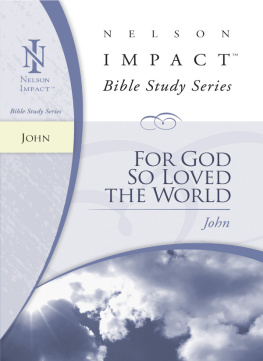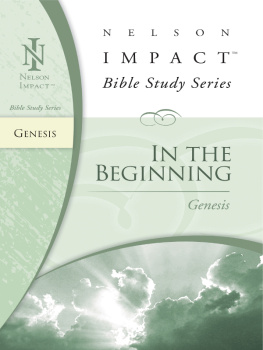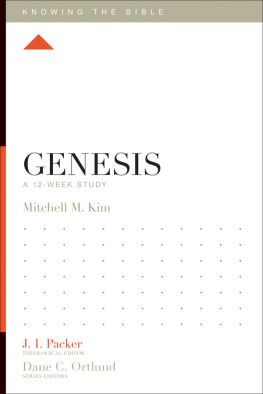Printed in U.S.A.
Copyright 2022 by
KENYONS GOSPEL PUBLISHING SOCIETY
ISBN 978-1-57770-089-0
Lesson I
THE REASON FOR CREATION
M AN IS confronted with an unexplained creation of which he, himself, is a part. This creation and the iron hand of fixed laws that govern it, reveal to man a Master Designer. By that we mean that the Creator designed Creation that it might fulfill a certain purpose, the reason for its existence.
The purpose in creation seems to be to provide a suitable environment for man. In fact, if we take man out of creation, creation with its resources and its beauty has no reason for existing. If God created the universe as a home for man, He must have had a reason for creating man. Man, in every age of history, has sought in vain for this reason, the reason for his own existence.
Skepticism was born because man was unable to find a reason for creation. The first tendency of science was to become atheistic and materialistic, giving only a mechanical explanation of the universe. However, today, as scientists are delving more fully into the mysteries and wonders of creation, many of them have become God-conscious. They are realizing that behind creation there is an intelligent Creator. However, science has not been able to find Him, or His purpose in creation with just Sense Knowledge... knowledge derived from the five senses.
Mans inability to know God is due to the fact that God is a spirit, and that man has no contact with Him. In his own spirit nature, man is alienated from God; and every contact that he has with the universe, or reality, he has through his central nervous system and his five senses. Through these five senses (namely, sight, hearing, touch, taste and smell) man has not been able to contact God. He has learned a great deal about physical nature which is indifferent and many times cruel toward human life, but he has not been able to find God personally, or His reason for creating man.
By this we can see that man in himself cannot find God. God must reveal Himself to man, and God has done this very thing. He has given a revelation of Himself to man. He had to give the revelation upon mans level so that man would be able to contact it. We call this Revelation Knowledge. It is obtained through our recreated spirits from the Word of God.
The second chapter of I Corinthians, which tells us of this revelation, gives us the following illustration (I Cor. 2:11) : For who among men knoweth the things of a man save the spirit of a man which is in him? Even so the things of God none knoweth, save the spirit of God. Man, limited to his sense knowledge, is unable to know the inner thoughts of a man. There is a veil of flesh that he cannot penetrate with his sense of sight, hearing or touch. However, a man, by the medium of words, may convey his inner thoughts to another.
So God, in His desire for man to know Him, has formulated His inner thoughts and purposes into words, which man can see with his sense of sight, and hear read or expounded, with his sense of hearing. I Cor. 2:12, 13, But we receive not the spirit of the world, but the spirit which is from God: that we might know the things that were freely given to us of God. Which things also we speak, not in words which mans wisdom teacheth, but which the spirit teacheth: combining spiritual things with spiritual words.
The Bible is Gods revelation to man, and because we have no other channel through which we can know God or contact Him, we turn to that revelation to find out what He has told us of His reason for creating man.
The Earth Is the Reason for the Heavens
Our earth is so small in comparison to the vast number and sizes of the heavenly bodies, that the study of it would be utterly absurd, if it were not for the fact that it is the only planet known to be inhabited by human life.
The first chapter of Genesis reveals that the earth holds a place in the plan and purpose of God that amazes one.
Genesis 1:14-19 declares that the earth is the reason for all the heavenly bodies that swing in their orbits through dark, illimitable space.
Science does not deny the fact that there is not a planet, sun, moon, or star in all this vast universe which does not have its influence upon our earth.
Our sun is approximately ninety-three million miles away, yet it causes climatic conditions of heat, light, rain and winds, which make this planet capable of sustaining human, animal and vegetable life.
The little earth ball, with its precious freight of human beings, flies softly around the sun amply protected in its transparent case of atmosphere.
To refer once more to the Scripture: To let them be for signs and for seasons.
We know that the tides of the oceans and seas are influenced by the heavenly bodies. We know that heat and cold, drought and storms, are the direct results of planetary influences. Storms can be predicted for certain localities on this continent by the position and influence of certain planets. We know that frosts and heat waves are predicted months ahead by the sure knowledge of planetary positions.
From these deductions we see clearly that the planets are placed in the heavens to give us seasons, to be signs, and to be continual companions and servants, always ministering to the earth.
The heavens are earths only perfect timepiece. No watch or clock man has ever made can give us perfect time, but He who knows the path of the stars, knows that every star, sun, or planet will pass a certain given point in the great, unpathed space on schedule time.
The star may not have been seen for thousands of years, but it will appear at the crossroads of the Heavens, not one second ahead, nor one second behind its schedule.
Oh, the wonder of the Architect, the marvel of the Creator, the might of the Sustainer of this great universe. How thrilling it is that this earth of ours, so small that one thousand of them could be lost in the sun, is yet the center and reason for the universe.
The Reason for the Earth Is Man
If the earth is the reason for the stellar heavens, what is the reason for the earth?
Genesis 1 gives the account of Creation. Creation consists of a series of acts by God. These creative acts culminate in the creation of man. When man was created, Gods creative activity came to a rest.
Man was the goal of the whole creative movement. Science must here agree with the Biblical account of creation in the placing of man at the summit of creation. He was the last and the highest of Gods works.
The earth has no reason for existing outside of man. Unconscious nature cannot enjoy its beauty, contemplate, nor use what it has produced.
Only when God placed upon this earth a man created in His image, was there a reason for the vast universe which had been created. God had endowed this man with the capacities to enjoy the beauty of His workmanship, and to utilize its resources.
Isaiah 45:18, For thus saith Jehovah that created the heavens, the God that formed the earth and made it, formed it to be inhabited. The Word declares here that God created this earth to be inhabited by man. In His creative acts He met every need that man would have in his life upon earth.
Ages on ages He wrought in storing up treasures of all kinds of wealth for his man. He filled earths bosom with deposits of iron, copper, silver and gold, and with uncounted varieties of metals, chemicals and forces.
He covered the face of the earth with mountains, valleys, ravines, plateaus and prairies, lovely rivulets, streams and rivers, and with many beautifully colored flowers that thrilled with joy the heart of Gods man. Fruits and vegetables supplied food for man. The Great Architect of human need and joy knew mans needs, while yet unborn, and in creations wondrous plan, these needs were met.















